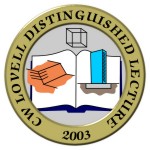
1st C.W. Lovell Distinguished Lecture
| - |
May 12, 2003
Mark Randolph
Science and empiricism in pile foundation design
Scientific approaches to pile design have advanced enormously in recent decades and yet, still, the most fundamental aspect of pile design---that of estimating the axial capacity---relies heavily upon empirical correlations. Improvements have been made in identifying the processes that occur within the critical zone of soil immediately surrounding the pile, but quantification of the changes in stress and fabric is not straightforward. This paper addresses the degree of confidence we can now place (a) on the conceptual and analytical frameworks for estimating pile capacity, and (b) on the quantitative parameters required to achieve a design. The discussion is restricted to driven piles in clays and siliceous sands, with particular attention given to extrapolating from design approaches derived for closed-ended piles of relatively small diameter to the large-diameter open-ended piles that are used routinely in the offshore industry. From a practical viewpoint, we need design approaches that minimize sensitivity to the estimated pile capacity. This may be achieved partly through a greater reliance on pile load testing, where significant advances have been made in the last decade, but also by adopting design approaches that are focused more on guarding against unacceptable deformation of the complete foundation. Example applications in the paper are drawn both from offshore applications, where current challenges include estimating the axial capacity of ultra-thin-walled, large-diameter caissons, and from onshore applications such as bridge piers and piled raft foundations, where inelastic displacement of the piles is not only acceptable, but often essential for efficient design.
About Mark Randolph
| - |

Professor Randolph received his PhD from Cambridge University for theoretical studies of the performance of pile foundations. After lecturing at Cambridge for 8 years, he was recruited to the University of Western Australia, where he is currently Director of the ARC-funded Special Research Centre for Offshore Foundation Systems. He interacts closely with the offshore industry, particularly through his role as a Director of specialist geotechnical consultants, Advanced Geomechanics. His personal research interests include most aspects of pile design, but are currently focused on offshore developments in deep water, especially soil characterization and the estimation of limiting loads for foundation and anchoring systems.
Professor Randolph is a Fellow of both the Australian Academy of Science and the Royal Academy of Engineering. He was the recipient of the British Geotechnical Society Prize in 1982 and the John Henry Garrood King Medal in 2000. Prof. Randolph gave the 2003 Rankine lecture and has authored more than 110 journal publications and 149 conference papers.
Photos of 1st C.W. Lovell Distinguished Lecture
| - |


